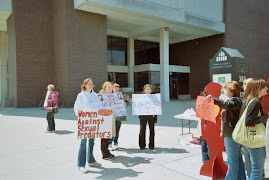indictment IN LANCASTER
Kids get message on sex abuse
Saturday, May 17, 2008 3:06 AM
By Mary Beth Lane
THE COLUMBUS DISPATCH
LANCASTER, Ohio --
No. Go. Tell.
That is the advice that children in Fairfield County are hearing to protect themselves from sex abuse.
Educators from the Child Advocacy Center of Fairfield County, which opened in September to investigate and prosecute child abuse and provide treatment to young victims, are visiting schools.
Their message goes like this: The parts of your body covered by a bathing suit are private, and if someone tries to touch those parts, you should say no, then go and tell a trusted adult.
The program is working, said Lancaster City Prosecutor Terre Vandervoort.
As a result of its efforts, a convicted sex offender is back in court on new charges.
A third-grader at Cedar Heights Elementary School in Lancaster listened to the presentation in class Feb. 26. Two days later, the 9-year-old indicated by her comments and behavior in the classroom that she had been sexually abused.
School administrators contacted her parents and county Child Protective Services workers the same week, and the girl was interviewed at the center the next Monday morning by a Lancaster police detective. She identified a neighbor, registered sex offender Virgil E. Larson Jr., as the abuser. The detective interviewed Larson later the same day.
"He made confessions, which resulted in him being arrested, and he was taken into custody that evening," Vandervoort said.
A county grand jury has indicted Larson, 27, on two counts of rape and six counts of gross sexual imposition. He is being held in county jail in lieu of a $50,000 cash or securities bond and a $25,000 recognizance bond. He is scheduled for trial on Tuesday.
"Obviously, that child was waiting for the affirmation to tell someone. It was an ongoing situation. It was not something that wasn't going to occur again," Vandervoort said.
Larson is among four registered sex offenders who Vandervoort has been trying to force to move because they live within 1,000 feet of a school, which is in violation of state law. Larson lives too close to Cedar Heights Elementary.
Common Pleas Judge Chris A. Martin ruled in July that Larson and the others must move, but he granted a stay of the ruling while the men appeal. Meanwhile, the Ohio Supreme Court has ruled that the residency restrictions don't apply to sex offenders who committed their offenses or were convicted before the law took effect in 2003. That includes Larson and the others.
"The (new) charges, as far as we are concerned, have nothing to do with the fact that he is living near a school," said David Singleton, executive director of the Cincinnati-based Ohio Justice & Policy Center, which represents Larson and the others in challenging the residency restrictions. "Drawing an arbitrary line does not do a thing to stop these types of crimes from happening. Kids live everywhere, not just near schools."
David Stansbury, Larson's court-appointed attorney defending him against the new charges, could not be reached for comment.
"Sometimes in government, the success of what you're doing is very intangible," Vandervoort said. "This time, you can actually say this project, this education did actually work and stop something for her and probably for another child. We don't get that very often."
mlane@dispatch.com
Hungry Wolves
-
This world really is sick and diluted with power hungry wolves who devour
any thing in their path.
As I look for the outcome of so many missing Childre...
2 years ago


